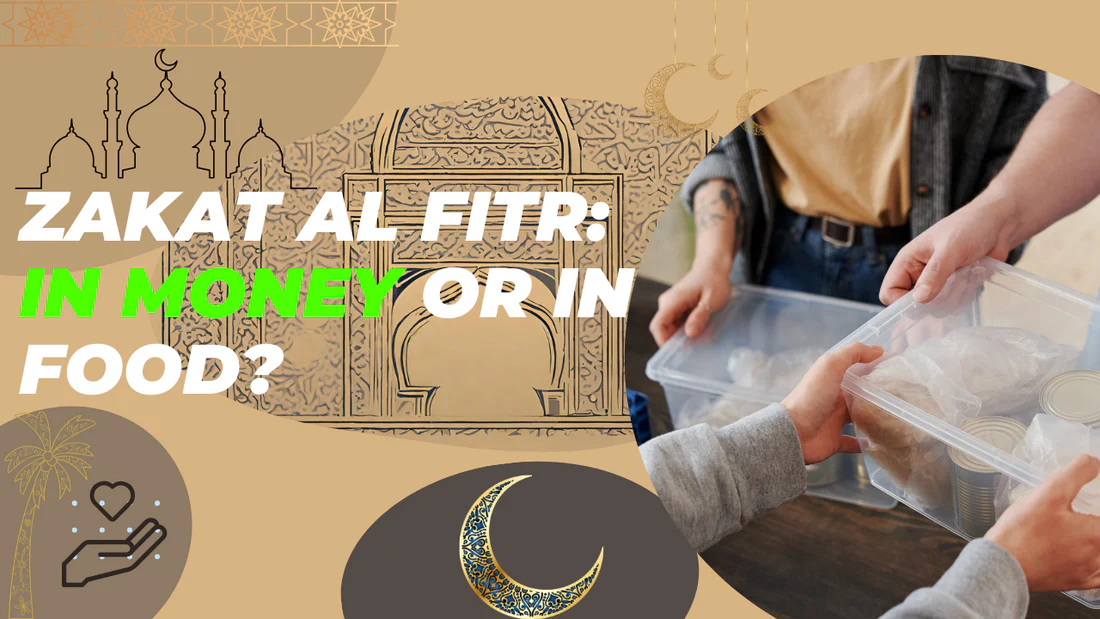Zakat al Fitr, also known as Fitrana, is a mandatory charitable donation distributed before Eid al-Fitr, marking the end of the holy month of Ramadan. This act of generosity purifies the fasting month, serves as a cornerstone of social responsibility within the Islamic framework, and provides much-needed assistance to the less fortunate.
Significance of Zakat al Fitr in Islam:
Zakat al-Fitr stands as one of the two mandatory charitable acts in Islam. Established during the early years of Islam, it coincides with the commencement of Eid al-Fitr festivities.
Unlike Zakat al-Mal (wealth Zakat), Zakat al-Fitr possesses a lower threshold, making it obligatory for every Muslim with surplus food provisions to sustain themselves and their family on the joyous Eid day. This charitable act extends to encompass all household members, including children, the elderly, and even those who were unable to fast due to illness.
The Quran emphasizes the importance of charity throughout the year, but Zakat al Fitr holds a special place. It ensures underprivileged individuals can celebrate Eid with dignity and relieves them from the financial burden associated with the festivities. Narrated in Sahih al-Bukhari, Prophet Muhammad (PBUH) said: “The Messenger of Allah (peace and blessings of Allah be upon him) enjoined Zakat al-Fitr on every free Muslim, slave, male, female, young, and old.”
Traditional Practices:
Distributing food ensured the immediate fulfillment of the recipients’ basic needs and allowed them to actively participate in Eid celebrations.
During the time of Prophet Muhammad (PBUH), staple food items like dates or barley were the primary mode of exchange. Hadith narrations, such as the one reported by Ibn ‘Umar (RA) in Sahih al-Bukhari, specify the quantity as one Saa’ (approximately 3 kilograms) of these commodities.
Ideally, Zakat al-Fitr should be distributed before the commencement of the Eid prayer. However, scholars from various Islamic schools of thought acknowledge a permissible window for earlier distribution, ranging from a day or two beforehand to the beginning of Ramadan or even the start of the year depending on the specific school.
The recipients of Zakat al-Fitr are those designated as eligible for regular Zakat, encompassing the poor, the needy, and others specified in Islamic scripture. Distributing the charity within one’s local community is highly encouraged, fostering a sense of local support and ensuring aid reaches those in close proximity.
Interpretations of Zakat al Fitr:
The core objective of Zakat al Fitr – alleviating the financial strain on the underprivileged during Eid – remains constant. However, the changing social and economic landscape has led to contemporary interpretations regarding the mode of distribution.
Divergent Views among Scholars:
While some scholars advocate for strict adherence to the traditional method of distributing food staples, others acknowledge the practicality of monetary contributions in the modern world. Here, it’s important to acknowledge that:
- The Quran and authentic hadiths emphasize the act of giving food: The Prophet (PBUH) explicitly mentioned specific food items like dates and barley as the standard for Zakat al Fitr.
“[We used to give] one Saa’ of dates, one Saa’ of barley, one Saa’ of raisins, or one Saa’ of dried yogurt.” (Sahih al-Bukhari)
However, scholars also acknowledge the following:
- Scholars throughout Islamic history have allowed for alternative methods in specific situations: There are documented instances during the era of the Companions where the value of the food items was given instead of the actual commodities.
- Ibn Taymiyyah, a renowned scholar, argued for the permissibility of cash in certain contexts: He reasoned that in situations where monetary contributions could better serve the needs of the poor, such as in large cities, it becomes a viable option.
Therefore, while the ideal scenario remains fulfilling the Zakat al Fitr obligation with the specified food staples, there are instances where monetary contributions can be permissible.
Read also : 5 FUNDAMENTALS ABOUT BREAKING THE FAST
Arguments for Giving Zakat al Fitr in Money:
- Practicality and Convenience: Monetary contributions are easier to manage, store, and transport. This simplifies the collection and distribution process, especially for large organizations.
- Addressing Modern Needs: In today’s diverse society, the specific food requirements of recipients may vary. Money empowers them to purchase necessities that best suit their circumstances.
- Flexibility in Distribution: Charitable organizations can effectively utilize collected funds to procure essential food items in bulk, potentially obtaining them at a lower cost.
Arguments for Giving Zakat al Fitr in Food:
- Preservation of Tradition: Distributing food staples upholds the original practice established during the Prophet’s (PBUH) time and serves as a tangible reminder of the act’s purpose.
- Ensuring Direct Benefit to Recipients: Donating food guarantees that the intended beneficiaries receive the core necessities they require.
- Fulfilling the Spirit of Zakat al Fitr: Providing food directly aligns with the act’s purpose of offering immediate aid and enabling participation in Eid festivities.
Open discussions and seeking guidance from qualified scholars can help navigate the contemporary interpretations of Zakat al Fitr. Remember the verse from the Quran:
“Whoever obeys the Messenger has obeyed Allah, but whoever turns away – We have not sent you over them as a guardian.” (Quran, An-Nisa’ 4:80)
This verse emphasizes the importance of following the Prophet’s (PBUH) teachings and fulfilling our religious obligations.
The Middle Ground:
A potential solution involves combining both methods. A portion of the collected Zakat al Fitr could be used to procure food staples in bulk, while the remaining amount could be distributed as cash. This ensures the preservation of tradition while addressing the practicalities of modern times.
Local circumstances and established charitable networks can influence the preferred mode of distribution. Consulting with established Islamic scholars and organizations can guide the most effective approach within a specific region.
Muslims are encouraged to fulfill their Zakat al Fitr obligation by contributing to reputable charitable organizations or directly distributing to deserving individuals.
Our Take?
Zakat al Fitr serves as a vital pillar of social welfare in Islam. Regardless of the chosen mode of distribution, the core objective remains the same – extending a helping hand to those in need and fostering a spirit of compassion and generosity during the joyous occasion of Eid al-Fitr.

